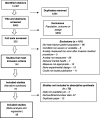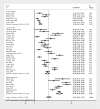Prevalence and Measurement of Anxiety in Samples of Patients With Heart Failure: Meta-analysis
- PMID: 25930162
- PMCID: PMC4915759
- DOI: 10.1097/JCN.0000000000000265
Prevalence and Measurement of Anxiety in Samples of Patients With Heart Failure: Meta-analysis
Abstract
Objectives: Rates of anxiety in patients with heart failure (HF) vary widely, and not all assessment instruments used in this patient population are appropriate. It is timely to consolidate the evidence base and establish the prevalence and variance of anxiety in HF samples.
Methods: A systematic review, meta-analysis, and meta-regression were conducted to identify the prevalence, variance, and measurement of anxiety in patients with HF.
Results: A total of 14,367 citations were identified, with 73 studies meeting inclusion criteria. A random effects pooled prevalence of 13.1% (95% confidence interval [CI], 9.25%-16.86%) for anxiety disorders, 28.79% (95% CI, 23.30%-34.29) for probable clinically significant anxiety, and 55.5% (95% CI, 48.08%-62.83%) for elevated symptoms of anxiety was identified. Rates of anxiety were highest when measured using the Brief Symptom Scale-Anxiety scale (72.3%) and lowest when measured using the Generalised Anxiety Disorder-7 (6.3%).
Conclusion: Many patients with HF would benefit if screened for anxiety and treated. The conceptualization and measurement of anxiety accounted for most variance in prevalence rates. The Generalised Anxiety Disorder-7 or the Hospital Anxiety and Depression Scale appear to be the most appropriate instruments for this clinical population, with evidence to suggest they can discriminate between depression and anxiety, omit somatic items that may contaminate identification of anxiety in a population with physical comorbidities, and provide thresholds with which to differentiate patients and target treatments. Although there are limitations with the collation of diverse measurement methods, the current review provides researchers and clinicians with a more granular knowledge of prevalence estimates of anxiety in a population of HF patients.
Conflict of interest statement
The authors have no conflicts of interest to disclose.
Figures


Similar articles
-
Depression and Anxiety in Heart Failure: A Review.Harv Rev Psychiatry. 2018 Jul/Aug;26(4):175-184. doi: 10.1097/HRP.0000000000000162. Harv Rev Psychiatry. 2018. PMID: 29975336 Free PMC article. Review.
-
Depression and anxiety as predictors of mortality among heart failure patients: systematic review and meta-analysis.Heart Fail Rev. 2016 Jan;21(1):49-63. doi: 10.1007/s10741-015-9517-4. Heart Fail Rev. 2016. PMID: 26572543
-
Deployment of personnel to military operations: impact on mental health and social functioning.Campbell Syst Rev. 2018 Jun 1;14(1):1-127. doi: 10.4073/csr.2018.6. eCollection 2018. Campbell Syst Rev. 2018. PMID: 37131363 Free PMC article.
-
Factors Associated With Depression and Anxiety for Community-Dwelling Patients With Heart Failure: A Retrospective Cohort Study.J Cardiovasc Nurs. 2023 May-Jun 01;38(3):210-223. doi: 10.1097/JCN.0000000000000958. Epub 2022 Nov 8. J Cardiovasc Nurs. 2023. PMID: 37027126
-
Systematic review with meta-analysis: anxiety and depression in children and adolescents with inflammatory bowel disease.Aliment Pharmacol Ther. 2018 Sep;48(5):496-506. doi: 10.1111/apt.14865. Epub 2018 Jul 8. Aliment Pharmacol Ther. 2018. PMID: 29984495
Cited by
-
Heart Failure in the Elderly: the Role of Biological and Sociocultural Aspects Related to Sex.Curr Heart Fail Rep. 2023 Oct;20(5):321-332. doi: 10.1007/s11897-023-00619-9. Epub 2023 Jul 27. Curr Heart Fail Rep. 2023. PMID: 37498496 Review.
-
Investigating the effect of an online enhanced care program on the emotional and physical wellbeing of patients discharged from hospital with acute decompensated heart failure: Study protocol for a randomised controlled trial: Enhanced care program for heart failure.Digit Health. 2024 May 28;10:20552076241256503. doi: 10.1177/20552076241256503. eCollection 2024 Jan-Dec. Digit Health. 2024. PMID: 38817841 Free PMC article.
-
The Impact of Social Determinants of Health on Outcomes Among Individuals With HIV and Heart Failure: A Literature Review.Cureus. 2024 Mar 10;16(3):e55913. doi: 10.7759/cureus.55913. eCollection 2024 Mar. Cureus. 2024. PMID: 38601377 Free PMC article. Review.
-
Palliative Care in Acute Heart Failure.Curr Heart Fail Rep. 2020 Dec;17(6):424-437. doi: 10.1007/s11897-020-00494-8. Epub 2020 Oct 29. Curr Heart Fail Rep. 2020. PMID: 33123954 Free PMC article. Review.
-
Identifying New Risk Associations Between Chronic Physical Illness and Mental Health Disorders in China: Machine Learning Approach to a Retrospective Population Analysis.JMIR AI. 2025 Jun 30;4:e72599. doi: 10.2196/72599. JMIR AI. 2025. PMID: 40611696 Free PMC article.
References
-
- Cimpean D, Drake R. Treating co-morbid medical conditions and anxiety/depression. Epidemiol Psychiatr Sci. 2011;20(2):141–150. - PubMed
-
- Naylor C, Parsonage M, McDaid D, Knapp M, Fossey M, Galea A. Long-term conditions and mental health: the cost of co-morbidity [report]. The King’s Fund and Centre for Mental Health. 2012.
-
- Vaccarino V, Kasl V. Depressive symptoms and risk of functional decline and death in patients with heart failure. J Am Coll Cardiol. 2001;38(1):199–205. - PubMed
-
- Jiang W, Alexander J, Christopher E, et al. Relationship of depression to increased risk of mortality and rehospitalization in patients with congestive heart failure. Arch Intern Med. 2001;161(15):1849–1856. - PubMed
-
- Hallas CN, Wray J, Andreou P, Banner NR. Depression and perceptions about heart failure predict quality of life in patients with advanced heart failure. Heart Lung. 2011;40(2):111–121. - PubMed
Publication types
MeSH terms
Grants and funding
LinkOut - more resources
Full Text Sources
Other Literature Sources
Medical
Research Materials
Miscellaneous

